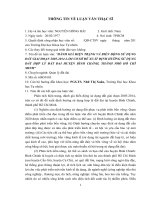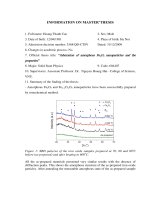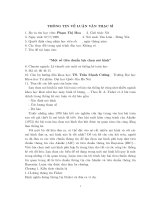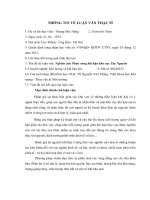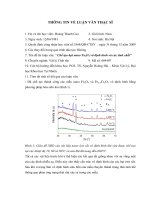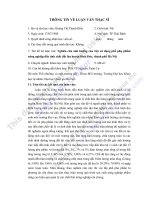Luận văn Thạc sĩ - Chưa phân loại | Hanoi University of Science, VNU
Bạn đang xem bản rút gọn của tài liệu. Xem và tải ngay bản đầy đủ của tài liệu tại đây (194.61 KB, 3 trang )
INFORMATION ON MASTER’THESIS
1. Full name: Hoang Thanh Cao
2. Sex: Male
3. Date of birth: 12/04/1981
4. Place of birth: Ha Noi
5. Admission decision number: 3568/QĐ-CTSV
Dated: 31/12/2009
6. Changes in academic process: No
7. Official thesis title: “fabrication of amorphous Fe2O3 nanoparticles and the
properties”
8. Major: Solid State Physics
9. Code: 604407
10. Supervisors: Associate Professor. Dr. Nguyen Hoang Hai– College of Science,
VNU.
11. Summary of the finding of the thesis:
- Amorphous Fe2O3 and Fe2-xCrxO3 nanoparticles have been successfully prepared
by sonochemical method.
Figure 1: XRD patterns of the iron oxide samples prepared at 70, 80 and 90oC
before (as-prepared) and after heating to 600oC.
All the as-prepared materials presented very similar results with the absence of
diffraction peaks. This shows the amorphous structure of the as-prepared iron oxide
particles. After annealing the metastable amorphous state of the as-prepared sample
has been transformed to crystalline states through solid state reaction occurring in
the samples.
- The morphology of the as-prepared and the annealed particles of all samples are
similar. Particle size increased from 5 nm for the as-prepared sample to 22 nm for
the sample annealed at 600oC for 15 min, which is due to the particle growth and
agglomeration process.
Figure 2: DSC data of the iron oxide sample prepared at Te = 80oC with the
heating rate of 10 - 30oC/min.
- There are three obvious exothermic peaks located at around Tp1 = 215, Tp2 = 265
and Tp3 = 505oC corresponding to the heating rate β = 10oC/min. All peaks have a
tendency of shifting to higher temperature as increasing the heating rate. The
activation energy of 105, 130 and 186 kJ/mol for the solid state reactions
corresponding to the three exothermic peaks Tp1, Tp2 and Tp3 were respectively
deduced by fitting to the experimental DSC data.
- Chromium ions have been used to replace iron ions in its oxide compounds due to
the ionic radius of same order. We study effect of the presence of Cr on the
crystallization process of materials. We study effect of the pressence of Cr on the
crystallization process of materials. The initial concentration of Cr3+ in Fe2-xCrxO3
was adjusted to have x = 0.05, 0.10, 0.15, 0.20 compared with the concentration of
Cr in the as-prepared samples determined from EDS data.
- All peaks have been shifted to higher temperatures compared to those of the iron
oxide sample. The activation energies relatively corresponding to T p1, Tp2 and Tp3
are 140, 156, 170 kJ/mol. Comparing to the amorphous iron oxide samples, the
activation energies were enhanced significantly for Tp1 and Tp2 whereas Tp3
reduced. For practical application, the enhancement of Tp1 is important which leads
to the fact that the amorphous state of the materials can last longer, stabilize at room
temperatures.
- Using the Kissinger equation to calculate the reaction time for the sample
Fe1.9Cr0.1O3, the reaction time can be up to 15 years.
12. Practical applicability
- Iron oxide nanoparticles have an important role in the arsenic filter. Thus, research
to slow the ageing process of the material is essential.
- The presence of Cr in the amorphous materials slow down the ageing effect by a
factor of 15 times. This is a good way for using the amorphous iron-chromium
oxide materials in practice.
13. Further research directions:
- To study the effect of chromium on the practical applicability of amorphous iron
oxide nanoparticles.
- Finding the best rate of chromium is to be able to slow the aging process of the
nanoparticles of amorphous iron oxide.
14. Thesis-related publications:
Nguyen Dang Phu, Trinh Xuan Sy, Hoang Thanh Cao, Nguyen Ngoc Dinh, Le Van
Thien, Nguyen Minh Hieu, Nguyen Hoang Nam, Nguyen Hoang Hai (2012),
“Amorphous iron-chromium oxide nanoparticles prepared by sonochemistry”, J.
Non-Cryst. Solids, 358, 537-543.
Date:5/3/2012
Signature:
Hoang Thanh Cao
